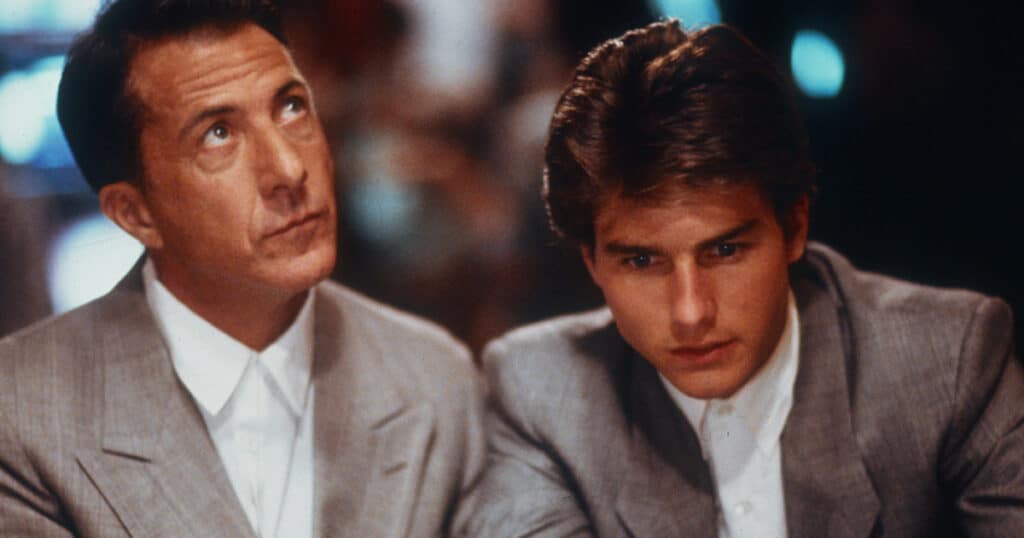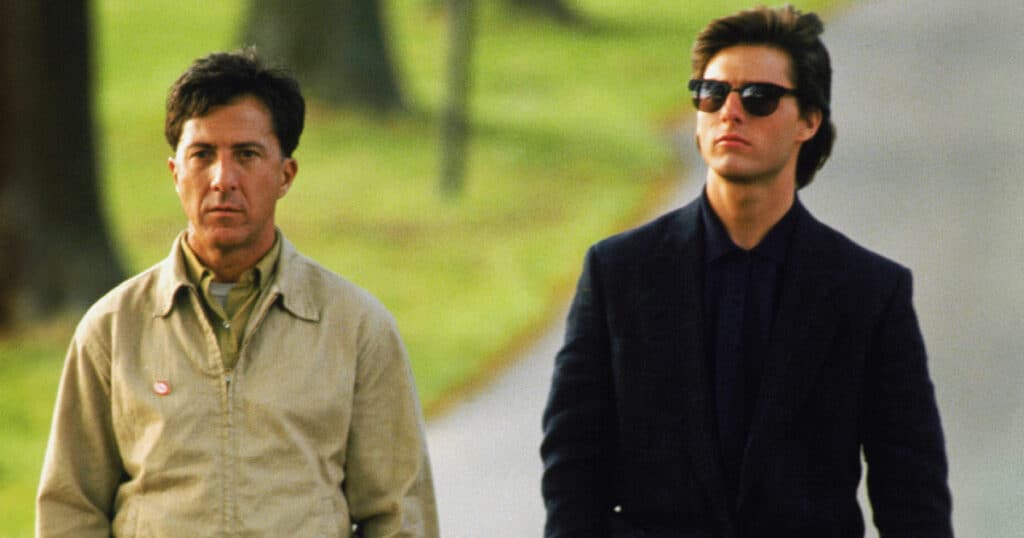We take a look back at Rain Man, one of the biggest early hits of Tom Cruise’s career and an Oscar winner for Dustin Hoffman.
Many people think Tom Cruise dancing around in his underwear to Bob Seger in Risky Business is his most iconic scene. To others, it’s him saying he feels the need for speed in Top Gun or infiltrating the vault in Impossible mission. Or “I want the truth!” But “show me the money!” But, to me, one of the scenes that best sums up Tom Cruise as one of the coolest movie stars ever is his entrance in Barry Levinson’s Rain Man. We see the smog-filled backdrop of Los Angeles as a Lamborghini flies across the screen. We see it’s being transported to a car lot where Tom Cruise’s Charlie Babbit, one of the most iconic eighties yuppies, inspects the car while The Belle Stars cover of “Iko Iko” fills the soundtrack. It’s a memorable moment that was so potent composer Hans Zimmer, when he reteamed with Cruise on Mission: Impossible 2, couldn’t help but riff on it by using another cover of “Iko Iko” on the soundtrack as Cruise’s Ethan Hunt did the world’s scariest rock climbing. In this episode of Tom Cruise Revisited, we look back at Rain Mana movie that proved two things – in 1988, Tom Cruise was the world’s biggest movie star, and he was a legit actor to boot.
Tom Cruise is an iconic movie star, but all too often, his acting talents are overlooked. Some of his dramatic performances, such as in Born on the Fourth of July, Magnolia, The Last Samurai and many others, put to shame many of the most acclaimed performances of their respective years, but his talent is taken for granted. It could be that he makes it all look effortless. Many critics unfairly wrote him off as a pretty boy in the eighties. His performance in Tea Color of Money had won over a few, but no one took him seriously until he paired up with Dustin Hoffman for Barry Levinson’s Rain Man. In it, Cruise plays a selfish Los Angeles yuppie who discovers that he has a long-lost brother, Raymond, who’s been left their late father’s sizeable estate. It turns out Raymond is autistic and has been confined to an institution for most of his life. Charlie takes custody of him to get access to his father’s money, but he will be challenging to bring him home to LA, as Raymond refuses to fly. Well, except Qantas that is… The two brothers embark on a classic road trip, and along the way, realize Charlies his brother is a mathematical savant, meaning a quick stopover in Vegas is in the cards so that his brother wins big at poker and cover his debts

Of course, Charlie starts to grow up as the film goes on, learning to value not only his brother but also his relationship with his girlfriend, Susanna, played by Valeria Golino. When people discuss Rain Man, they mainly focus on Hoffman’s performance. Indeed, he has the showier role, with him winning an Oscar for the part. Cruise should have been nominated. Revisiting the movie now, it’s clear that Cruise grounds the film and is the protagonist, with Hoffman actually supporting him, not the other way around. Critics got lost in the flash of Cruise’s performance, with him impeccably tailored throughout, sporting ray bans and a great eighties haircut. But Cruise brings a lot of vulnerability to the role, with him a charismatic hustler who’s not the pretty cold-blooded, calculating shark he needs to be. It’s a terrible part, and the story of how Rain Man came to be made is fascinating.
Initially, Steven Spielberg was set to direct but needed to start work on Indiana Jones and the Last Crusade. Sydney Pollack, who had made Tootsie with Hoffman, was also considered, but the job went to Barry Levinson in the end. The Baltimore-born director was coming off a massive hit, having made Good Morning Vietnam. The screenplay was written by Ron Bass and Barry Morrow, both of whom won an Oscar for it. Morrow was inspired by two real-life scholars, Kim Peek and Bill Sackter. Where the movie eventually got into trouble was the idea to make Raymond not only a Savant but also autistic. This harmed the public’s perception of autism, with it a totally separate condition, and the odds of having both autism and savant syndrome were tiny. The movie made it seem like it was commonplace.
Nevertheless, Hoffman spent a year preparing for his role and was plagued with self-doubt throughout the filming, begging Levinson to replace him with Bill Murray. Cruise and Hoffman apparently would rehearse and trade-off parts in-between filming, and indeed the two became close on-set. One noteworthy thing is that Rain Man was one of the first American films to be scored by Hans Zimmer, whose usual, partly electronic score earned him his first Oscar nomination. It was one of the first scores he composed without his regular collaborator, Stanley Myers. It kickstarted his career, with him scoring black rain the next year and quickly becoming one of the hottest composers in town, to his eventual mogul status.

Rain Man was a smash hit at the box office, earning a massive $172 million domestically, good enough to make it the top-grossing movie of the year. Interestingly, it opened at second place at the box office behind a movie it shared several similarities with, Twins. In the end, Rain Man would clean up at the Oscars, with Hoffman winning best actor, Levinson winning best director, and the film also taking home best picture and best screenplay. In the autism community, the film has a mixed legacy. On the one hand, the film led to a common stereotype, being that people on the autism spectrum have savant-like abilities. On the other hand, the movie significantly increased awareness of the disorder. Notably, the film also led to people believing that card counting is somehow illegal in Las Vegas. It’s not – so if you’re able to count cards – go ahead.
While Cruise’s performance would go somewhat unheralded, he found one prominent fan, with actor Michael Caine once citing it as his favorite screen performance. It turns out the reason for this was intensely personal to Caine, with him discovering, late in life, that he, too, had a long-lost brother who had spent most of his life institutionalized. Indeed, he maintains that while Hoffman has the showy part, Cruise’s is the one that requires the most discipline, and indeed it remains one of the actor’s best performances. But, watching Dustin win the Oscar might have stung a little for Cruise, who, in his next film, would get the “showy” part and would prove, once and for all, that when he wants to be, he can be as good of a dramatic actor as anyone.

